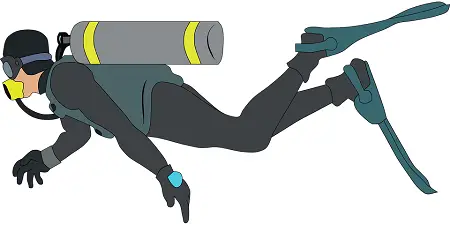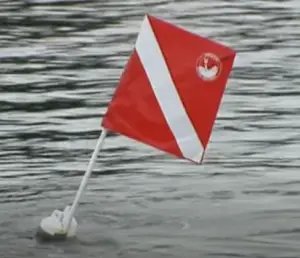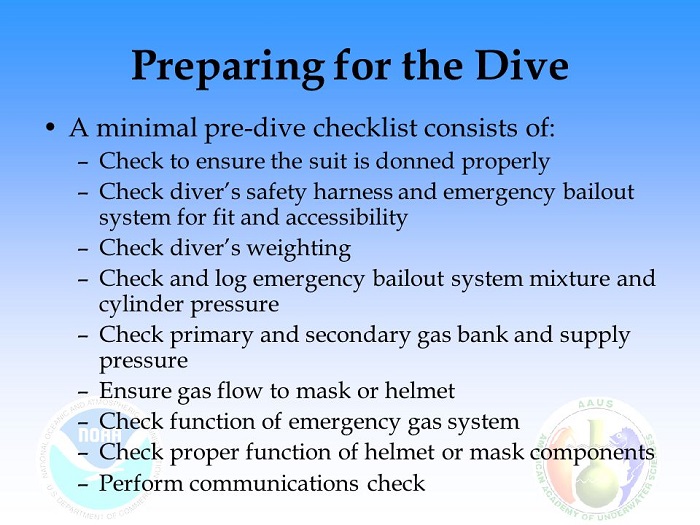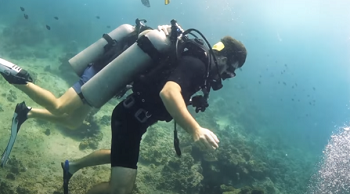Diving is a popular sport, and it can be very rewarding. However, there are dangers associated with this activity. The most important thing for divers to do is make sure they have their own safety equipment such as fins, masks, snorkel, etc.
Unfortunately, a lot of people don’t know what they should do for their own safety when diving. To help you avoid injury and stay safe underwater, here are some tips to follow:
Never dive alone, Stay close to shore or another diver if possible, Don’t wear jewelry while diving (it can get caught on coral), Always inspect your equipment before diving, and only dive with reliable sources that have been certified.
It is important to choose a location that has good visibility for the divers so they can avoid running into coral or rocks by accident.

What should divers do for their own safety?
Divers must carry their diving flag when snorkeling in addition to wearing a life vest. They should always display the diving flag in the water. As a diver, you must stay close to the flag. This is because divers sometimes surface in other places when they run out of air and you might not notice them if they don’t have a flag.
Must display “A red flag with a white diagonal stripe” or “Alfa flag”

They should never dive or snorkel alone. It’s always a good idea to partner up with another diver so you have someone to watch your back in case something goes wrong. If this is impossible, it is important that you familiarize yourselves with the area before diving as best as possible.
Look for any hazards or threats on your map, and make sure to steer clear of them during your dive. Remember, there may be hidden rocks, coral reefs, or other such items around that you could easily run into if you are not careful.
If you are planning to go on a boat ride, it is a good idea to hire a professional dive instructor. Their job is not only to be an instructor but also to make sure that all of their clients have fun while they are out in the water and stay safe as well.
It is important for divers to make sure that the boat they are using is properly anchored. You never know what could happen during your trip, and having a stable boat will ensure that you don’t have to worry about it tipping over and leaving you in the middle of nowhere with no help in sight.
It’s also a good idea not to overload your boat because it can lead to accidents and injuries. Be sure to pay attention to what you are doing when you are getting ready for your dive, and don’t take any unnecessary risks.
Divers should also familiarize themselves with marine-related rules and regulations since there may be areas where it is prohibited to dive or snorkel at all. Do not approach animals, and avoid causing stress by crowding, overhandling, startling, or otherwise bothering them.
It is a good idea for divers to bring their own snorkeling equipment along with them in case they need it while they are out on the water. If they have the necessary equipment with them, they will be more likely to enjoy their trip because they won’t feel like they are stuck making do with other people’s stuff.
When you’re diving, it is important for you to understand that there may be times when you run out of air and need to swim quickly back up to the water’s surface.

How do you protect yourself when diving?
Always breathe in slowly and don’t hyperventilate before diving. Try to relax as best you can when you dive, and try to remember to never make any rapid movements underwater. Also, try not to do anything that will put too much stress on your body while you are down there.
Do not hold your breath while you dive, and always make sure that your mask is secure on your face. If you are using scuba gear, use a regulator to help you breathe easier underwater. It will allow you to control how much air goes into your body so that there is never a lot of pressure building up in your lungs or anything like that.

Practice safe ascents when you are diving. When you get to the surface, take your time in order to let all of the air that was trapped in your body flow back into the water. The slower you do this, the better off you will be when it comes to avoiding injury and decompression sickness.
Check your gear before you dive. Make sure that everything is secure, and make sure that it works properly as well. If you have any issues, try to fix them before you enter the water.
Dive within limits. You should never dive deeper than you are capable of, and if you have any problems while diving, such as the bends or decompression sickness, don’t be afraid to come back up. Never put yourself in a dangerous situation just because it’s an exciting one.
When you are diving, don’t do anything that could be considered dangerous. It is important for you to follow the law when it comes to diving, so never try fishing or spearfishing while scuba diving.
It is important that divers always wear their equipment properly so that they will not have to worry about getting injured. Take responsibility for everything that happens to you while you dive.
Physically fit people are better divers. If you aren’t in good shape, try to get into it before you go on your diving trip.
Never dive if you have a cold, ear infection, sinusitis, or any other types of respiratory problems. They can ruin your trip and even lead to permanent injuries.
You should never dive alone. Always have another diver with you because it will help if anything goes wrong while you are diving. If one person has an emergency, the second person could come up for air and get help for the first diver. Use the buddy system so that you are always safe and never have to worry about decompression sickness or anything of the sort. Divers must be alert at all times and never dive alone.
You should always be alert when you are diving. Use your dive flag to let other boaters know that you are in the area and need to be respected, and make sure that you follow all safety precautions so that everyone knows what the rules are.
Plan everything before you do. Research the area where you will be diving and know what to expect when you drop into the water. This way, you can prepare yourself for anything that might happen while you are under the surface of the water.
If possible, all of your diving plans should be made public knowledge. If your friends or family know where you are going and what time you expect to return, they will be better able to help you if anything goes wrong.
When should you not dive?
If you’re not in good shape, you shouldn’t go diving. If you’re overweight or out of shape, it can be hard to deal with the pressure changes during a dive and might lead to pulmonary barotrauma, which is what happens to your lungs if they are overinflated. If you are out of shape, lose weight so that you can dive properly.
Never dive if you have sinus problems or lung issues. If your ears are not working correctly, you shouldn’t try to scuba dive.
Take medical tests before you go diving. Make sure your ears are working properly. Also, check to make sure that your eyesight is correctable after you use contacts or glasses.
Never dive during extreme weather conditions such as thunderstorms, hurricanes, or severe tropical storms. These bring in choppy seas and bad weather, which can make it difficult to dive.
Vessel operator should follow the below factors
As a vessel operator, you should recognize a diver-down flag.
All vessels should stay at least 150 feet away from a diver-down flag. No vessel operator should ever directly pass a diver, and no vessel operator should drive the boat while someone else is diving.
Bubbles may indicate divers are surfacing. Watch out for divers as they surface, and avoid driving your vessel to them when they are above the water.
Conclusion
Diving is one of the most exhilarating and rewarding activities you can do, but it comes with some risks. When diving in a group, divers should always display the diver-down flag to alert other boats or people on shore that they are below water so no one accidentally diver over them. They also need to stay close to their boat at all times while anchored securely and never overload the vessel with people, equipment, or supplies for safety reasons.
Last but not least when diving alone avoid doing anything risky like penetrating caves without proper training because this could lead to injury or death. What else would you add?
